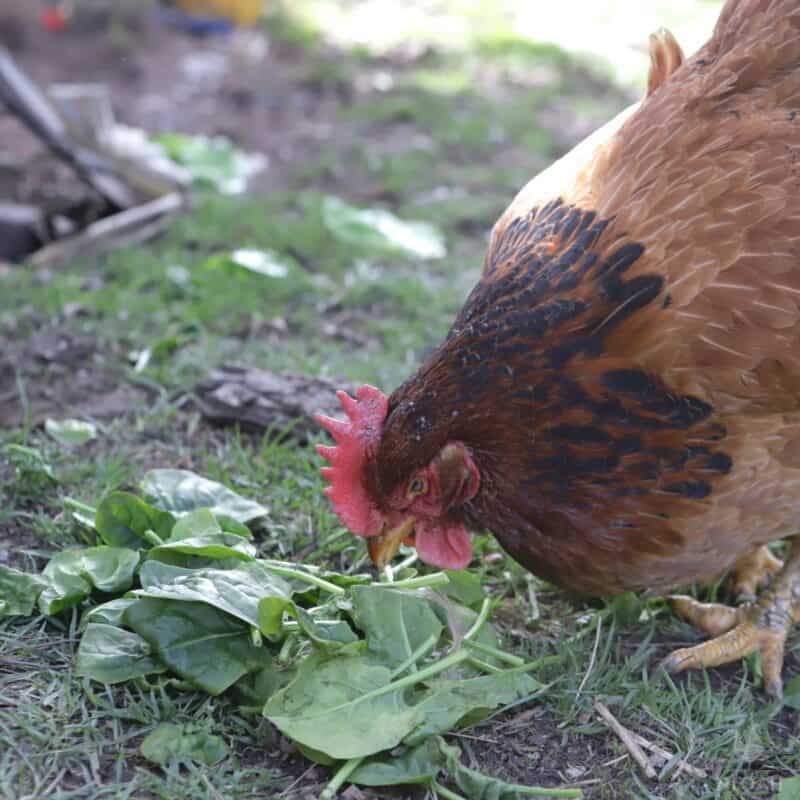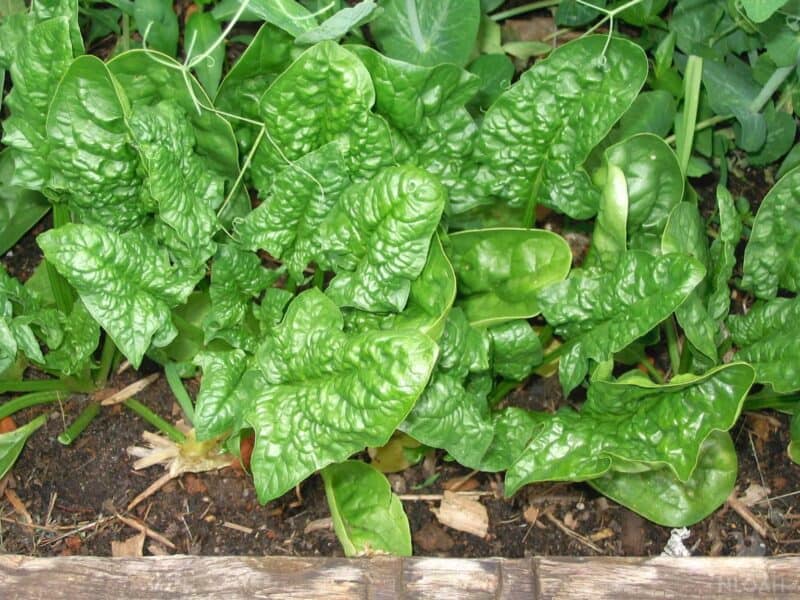Chickens are adventurous and adaptable eaters, capable of consuming all kinds of meats and all sorts of fruits and vegetables.
One of the most nutritious vegetables around is spinach, rightly famed for its vitamin and mineral content. It sounds like it would make for a great addition to a chicken’s diet…

But can chickens safely eat spinach?
Yes, chickens can safely eat spinach but in moderation, but the presence of oxalic acid can lead to issues with calcium absorption if they are allowed to eat too much.
Spinach is extremely healthy for them, packed full of all kinds of vitamins and minerals, and one of the best vegetables you can supplement a chicken’s diet with.
While spinach is undoubtedly a superfood for people, and we should eat as much of it as we can, it comes with a caveat for chickens due to the presence of the aforementioned oxalic acid.
However, this is a small concern considering all of the benefits that spinach brings to the table. We will tell you what you need to know in the rest of this article.

Nutritional Profile of Spinach
Spinach has often been rightly called the king of the leafy green vegetables, and with good reason.
It’s vitamin and mineral profile is second to none, and it even has a little bit of protein in the bargain.
Concerning the vitamins, spinach contains a ton of vitamin A equivalent, beta-carotene, most of the B complex vitamins including folate, vitamin C, and vitamin E, along with a whopping amount of vitamin k, more than four times a human beings needed daily requirement.
| 100g Spinach | Amount |
|---|---|
| Water | 92.4g |
| Calories | 28 kcal |
| Protein | 2.91g |
| Total Fat | 0.6g |
| Ash | 1.42g |
| Total Carbohydrates | 2.64g |
| – Dietary Fiber | 1.6g |
| Calcium, Ca | 67mg |
| Iron, Fe | 1.05mg |
| Magnesium, Mg | 93mg |
| Phosphorus, P | 41mg |
| Potassium, K | 460mg |
| Sodium, Na | 107mg |
| Zinc, Zn | 0.42mg |
| Copper, Cu | 0.079mg |
| Manganese, Mn | 0.426mg |
| Iodine, I | 6.1µg |
| Vitamin C | 30.3mg |
| Thiamin | 0.076mg |
| Riboflavin | 0.192mg |
| Niacin | 0.51mg |
| Vitamin B-6 | 0.214mg |
| Biotin | 4.25µg |
| Folate, total | 113µg |
| Vitamin A, RAE | 306µg |
| Carotene, beta | 3670µg |
| Cryptoxanthin, beta | 10µg |
| Lutein + zeaxanthin | 7920µg |
The good news continues when you are assessing the mineral content of spinach.
Iron, calcium, magnesium, manganese, and potassium are all present in abundance, with lesser but still significant amounts of phosphorus, zinc, and sodium.
Spinach also has a little bit of fiber and is mostly water by weight, about 91% by mass on average.
Health Benefits of Spinach for Chickens
The health benefits of spinach for your chickens are almost too numerous to detail here, but we will do our best.
The massive amount of vitamin k present in spinach can help to prevent internal hemorrhaging by improving blood clotting, and also prevents blood spots in eggs.
Combined with the calcium content of spinach, this is a great benefit for laying hens and for a healthy skeleton overall.
Vitamin E is an antioxidant that can help fight off diseases and improve the function of nervous system tissues.
The B complex vitamins are critical in numerous roles throughout the body, typically pertaining to metabolism but also in the digestion and uptake of various amino acids and other nutrients.
Meanwhile, vitamin A is vital for cellular growth, replication, and other related functions.
Can Chickens Eat Spinach Raw?
Yes, chickens may eat raw spinach and this is the preferred way to serve it to them.
Some birds show a little hesitancy to eat spinach this way at first, but if you give them time, they should come around and become big fans of it.
Can Chickens Eat Spinach Cooked?
Yes, chickens may eat cooked spinach with no problems, though you should know that the cooking of spinach tends to significantly reduce its nutritional content.
Then again, so does leaving raw spinach simply sitting around, so if you cannot serve them raw spinach right away there is little to be lost by cooking it.
Never Feed Spinach to Chickens that Has Been Prepared with Harmful Ingredients
Since we are talking about cooking, it is important to point out that you should never, ever serve spinach to your chickens if it has been cooked or otherwise prepared with harmful ingredients that they should not eat.
Salt, sugar, butter, bacon, various oils, and so forth are all highly caloric or otherwise dangerous for chickens to consume.
The temptation to simply give them the leftovers from your own table prepared as such is high, but you must not do so.
At best, your chickens can be facing seriously upset stomachs, diarrhea, and weight gain but at worse serious diseases and other health complications might result, including sodium poisoning and fatty liver hemorrhagic syndrome.
Beware of Pesticide on Grocery-bought Spinach
Spinach is a great supplement for the diet of your birds, and even better because it is so inexpensive and freely available.
However, if you are purchasing spinach from the grocery store you must be aware of the pesticide content that is likely to be present.
Pretty much all produce that is intended for consumers is treated from inception to harvesting with abundant pesticides and other chemicals to protect it from pests.
Even though most of this produce is washed before being packaged and sent off to the consumer, many residues remain and could prove to be significantly toxic to your birds.
You must wash or soak spinach that you purchased from the grocery store in order to further remove this chemical residue prior to serving.
If at all possible, buy organic brands from the grocery store, if in stock, or grow your own spinach so you can eliminate these chemicals from your food chain.
How Often Can Chickens Have Spinach?
Spinach is extremely healthy for chickens, but it is not nutritionally complete for them and furthermore the presence of oxalic acid can cause health problems if you allow them to overindulge or overfeed them.
First things first, only about 10% of your chicken’s calorie intake should be in the form of supplemental foods, be it fruit, vegetable, or other, and that includes spinach.
Spinach should be only a part of that 10% category, so your chickens should only be getting spinach once or twice a week.
Negative Effects of Eating Too Much Spinach
Even more importantly, spinach contains a fairly high amount of oxalic acid, and though it is not truly poisonous like other compounds sometimes found in common produce, such as solanine or theobromine, it nonetheless can cause harm if too much is ingested.
Oxalic acid blocks the absorption of calcium in the chicken’s body, and this can prove to be especially deleterious for laying hens.
Too much spinach will likely result in thin or even entirely absent eggshells for hens, and then other health problems.
Preparing Spinach for Your Flock
It is easy to prepare spinach for your flock. If serving them raw spinach, all you need to do is set out a bunch of leaves or a head of spinach and let them peck on it to their heart’s content.
Spinach is easy enough to tear so they’ll be able to consume small bites as needed.
If serving them cooked spinach, simply place it in a bowl or tray and then set it where your birds can reach it. Consider using multiple bowls or trays at various feeding points to allow every bird a chance at getting some.
Can Baby Chicks Have Spinach, Too?
Yes, chicks may have spinach starting in about 3 weeks old.
Spinach is good for chicks, but compared to adults they have even more sensitive nutritional requirements and sensitive digestive tracts.
Spinach might upset the balance of both, so you want to give them only a few bites, maybe once a week, and then keep an eye on them to make sure they don’t suffer any ill effects.
It is worth mentioning that chicks are particularly vulnerable to both crop and passion and diarrhea when eating novel, leafy foods, just like spinach.
Tom has lived and worked on farms and homesteads from the Carolinas to Kentucky and beyond. He is passionate about helping people prepare for tough times by embracing lifestyles of self-sufficiency.
